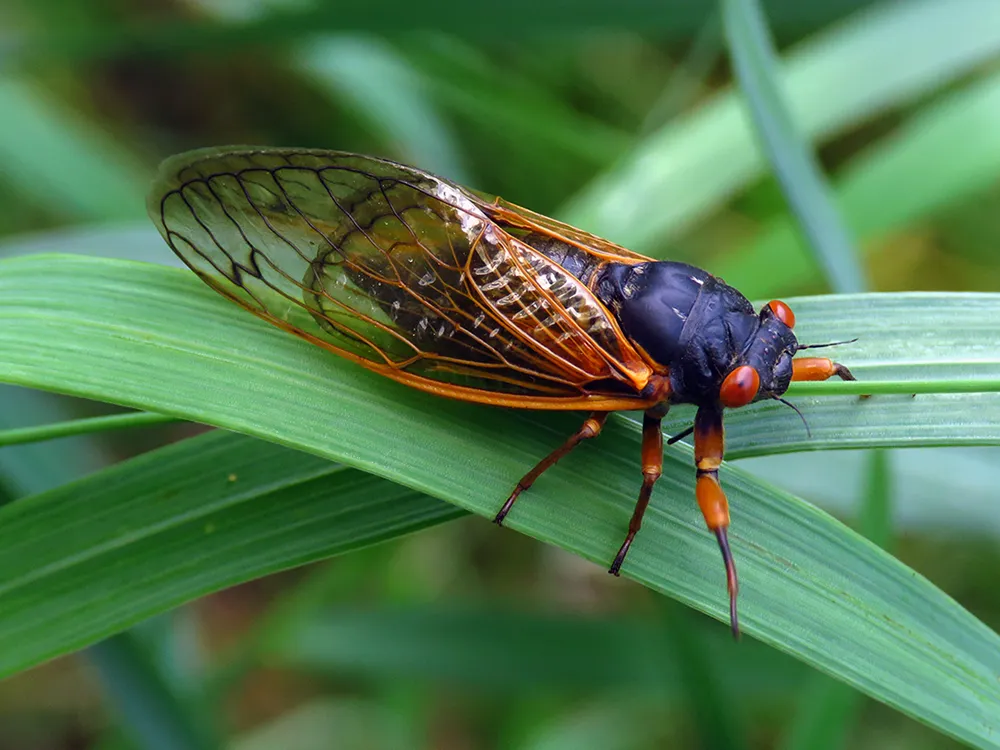Imagine stepping outside on a warm sunny day in early June, ready to relax, just to find the ground covered in millions of cicadas. Well, for the first time since 1803, the cicada Broods XIX and XIII are returning to Illinois for the summer.
Cicadas are insects with distinct features such as black bodies, orange stomachs, bright red eyes, and clear membranous wings with black veins. Another factor that helps determine cicadas is the sounds they make. Male cicadas use an organ called the tymbal located in their abdomen to produce their sound. When they are ready to mate, the muscles in their abdomen vibrate very quickly which causes the tymbals and rub together and produce the buzzing sound a cicada makes. The hollow body of the cicada allows the sound to be heard from a distance of 1.5 miles away at 100 decibels (the same amount of decibels a construction site makes).
Female cicadas also produce a sound, but it is a different type of sound. While the male cicada creates a buzzing sound, the female cicada creates more of a clicking sound. They rub their wings together to create the sound letting the males know they are ready to mate with them. Since there are 3,000 different cicada species, each species produces a slightly different sound, that way cicadas from the same species can find each other to mate.
Why are so many cicadas coming to Illinois this summer?
There are two different types of cicadas: yearly and periodical cicadas. Yearly cicadas emerge once every year while the periodical cicadas only emerge after a few years. The periodical cicadas emerging this summer are the Broods XIX and XIII. A cicada brood is a group of different cicada species that have the same emergence cycle. The Brood XIX has a 13-year cycle while the Brood XIII has a 17-year cycle. They usually do not overlap with each other, but every 221 years, they end up overlapping. This will cause millions of cicadas to emerge all over Illinois.
Typically, two broods overlapping does not make much of a difference, but both of these groups are exceptionally large. The Brood XIX is the largest cicada brood with four different species. The species in the Brood XIX are called the Magicicada Tredecim, the Magicicada Neotredecim, the Magicicada Tredecassini, and the Magicicada Tredecula. The Brood XIII is also a very large brood with three different cicada species, the Magicicada Septendecim, Magicicada Cassini, and Magicicada Septendecula. This rare double emergence will cause 1.5 million cicadas per acre to emerge. For reference, an acre is roughly the size of a football field. Imagine 1.5 million cicadas on a football field; that is a lot of cicadas!
Will this many cicadas be harmful?
To a large extent, cicadas are not harmful to the environment. The most damaging thing a cicada can do to the environment is laying eggs. When a female cicada lays eggs, it cuts into the branches of a tree to create a spot for the eggs. A cicada might do this multiple times on the same branch which leaves scars on the tree. While the scars themselves are not harmful, any leaves growing around the scarring are at risk of dying, and twigs become more prone to falling off and breaking. Dying leaves and snapping twigs will only happen on recently planted trees, not strong, healthy trees.
While the effects on the environment are minimal, cicadas are no risk to humans. In fact, when cooked correctly, cicadas are actually a great source of protein. To avoid getting sick from the pathogenic microorganisms, it is important to cook them like you would raw meat or fish by sauteing or deep frying them. Cicadas are closely linked to seafood giving them a nutty flavor and shrimp-like qualities. Due to this relationship, people with shellfish allergies should avoid eating cicadas.
While this double emergence is a once-in-a-lifetime opportunity, not everyone is excited about it. Aubrey Murray, a sophomore at Lakes Community High School is not very excited about the mass of cicadas emerging this summer.
“I actually hate bugs,” stated Aubrey. “I think they will affect my outside time.”
She is also very bothered by the loud sounds all the cicadas will create.
“I think they’re really annoying,” mentioned Aubrey. “I actually don’t sleep with my window open in the summer because I think they’re obnoxious.”
While Aubrey is not very excited, Mr. Fries, the Journalism teacher at Lakes Community High School is very excited about the cicadas and wants to share this experience with his kids.
“I happen to like nature,” replied Mr. Fries. “I’m looking forward to hearing them at night and during the day and having my children listen to them.”
Mr. Fries cannot wait to hear how beautiful and loud the cicadas will sound this time around.
“I remember when I was a kid listening to the wonderful buzz of the cicada and I’m really looking forward to my kids hearing it,” explained Mr. Fries. “It’s a unique sound, and with the crazy amounts that we’re expecting, I really can’t imagine how loud it’s going to be.”
Although many people are not too pleased about the fact that millions of bugs will be covering the ground, the Broods XIX and XIII will help make this summer unforgettable for everyone.












